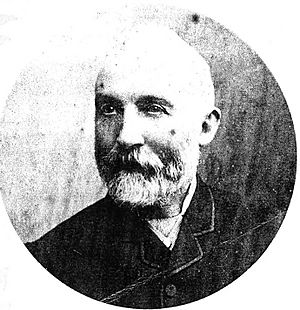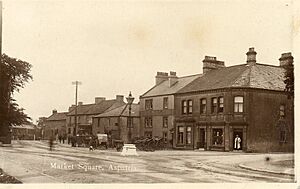Aspatria Agricultural Cooperative Society facts for kids
The Aspatria Agricultural Cooperative Society was started in Aspatria, England, in 1870. It was formed by local farmers who wanted to buy farm supplies like fertilizers, animal feed, and tools together. This helped them get better quality products and fair prices. Even though it began in a small farming town, this group was brave enough to take big companies to court if their products weren't as good as advertised. It was one of the first groups of its kind and is now thought to be the oldest in the world. This society also inspired three local men to help farming even more by creating the Aspatria Agricultural College, which was only the second college like it in the world.
Contents
How It Started
In 1869, a special fertilizer for turnips arrived in the Aspatria area. Two farmers, John Twentyman and William Norman, bought some. Mr. Norman, who was a trained chemist, thought the fertilizer didn't seem right. He asked a former co-worker, Thomas Anderson from Glasgow University, to check it.
Mr. Anderson confirmed Mr. Norman's suspicions. The fertilizer had much less of the good stuff than it was supposed to. Meanwhile, Mr. Twentyman used his fertilizer and got very poor results. A local animal doctor, Henry Thompson MRCVS, helped the two farmers meet. He suggested they start an Agricultural Society in Aspatria.
Forming the Society
At a dinner in September 1869, a local leader named Sir Wilfrid Lawson, 2nd Baronet of Brayton told farmers to join a similar group in Manchester. Mr. Twentyman took this idea further. He organized a meeting for local landowners and farmers. They wanted to create a small company to buy fertilizers and feed that had a guaranteed quality.
On January 24, 1870, twenty people agreed to set up rules for the new group. They chose the motto 'each for all and all for each'. Henry Thompson became the secretary. On April 14, 1870, the society officially registered. It was the first group of its kind in Cumberland.
The Society's Rules
The main goal of this society was to stop the sale of bad or fake products. They wanted to make sure members had control over what was bought for them. A committee, chosen by the members each year, had the power to make sure everything was fair. This meant that bad practices couldn't happen without the members knowing.
If a member could find better products somewhere else, the society didn't expect them to buy from the society. However, members knew that any extra money made by the society, after paying for costs and interest, would be given back to them. The committee also promised to be very careful. They would test products and get guarantees to make sure everything was pure and of the best quality. This focus on quality was a special feature of the society.
A Big Court Case
Later in 1870, a ship arrived with a special fertilizer called Peruvian guano. This guano was supposed to have a lot of ammonia, which is good for plants. The society bought 50 tons and shared it among its members. William Norman took samples from different batches. His tests showed that the guano had much less ammonia than promised.
The society's leaders decided not to pay for the missing quality, which was about £59. This made the seller very angry, and they took the society to court. Even though the first court decision was against the society, they immediately appealed. The case went through several courts and finally ended up at the House of Lords.
Winning the Case
After five years of arguments, the judge decided in favor of Aspatria. The court case cost the society about £630. However, the seller's legal costs were much higher, over £2,400. More importantly, the society had achieved one of its main goals: getting good value for their money, not just making a profit.
Even though the case was settled, it took another 36 years for the British government to create laws. These laws finally guaranteed the quality of fertilizers and animal feed.
A Successful Business
In its first six months, the society had sales of £4,381 and made a profit of £701. From this profit, they paid 5% interest on capital and covered their starting costs. They also gave discounts to members when they bought things. The remaining money, £228, was paid as a dividend to members who bought products.
By 1900, the society had grown to 327 members. Their yearly sales reached £13,467. Almost all the profit was given back to the members as interest and dividends. In 1920, when the society celebrated its 50th anniversary, Henry Thompson retired. He had been the secretary since the very beginning.
That year, the society, which was the oldest of its kind in Europe, reported sales of £40,000. Since it started, total sales had reached £800,000. They had paid £4,000 in interest to shareholders and £8,100 in dividends to members. Henry Thompson left behind a society that never aimed to be the biggest. Instead, it was known for its honesty and its promise to guarantee the quality of its goods and services.
Modern Times
In 1919, a special meeting decided not to combine the business with the Aspatria Cooperative Wholesale Society. So, the society continued to grow on its own. In 1976, the word "cooperative" was removed from its name. In 1990, it changed its name again to Aspatria Farmers Ltd.
On November 1, 2006, Aspatria Farmers took over Joseph Hillary Ltd. This was a company that sold farm machinery. The business then moved to Hillary’s location on Station Road in Aspatria.
 | Lonnie Johnson |
 | Granville Woods |
 | Lewis Howard Latimer |
 | James West |



